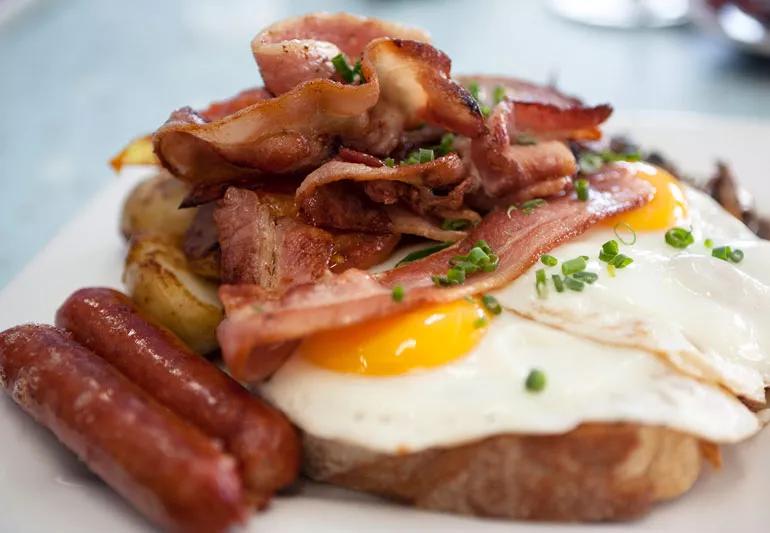Going overboard on protein can lead to weight gain and kidney damage, among other issues

Image content: This image is available to view online.
View image online (https://assets.clevelandclinic.org/transform/3cec2b52-7a6c-4ebb-adb4-6a63216e7b6a/proteinTooMuch-173921770-770x553_jpg)
Bacon, sausage links and eggs
Your body needs protein to function. But as with just about everything else in life, too much of a good thing is not actually a good thing at all.
Advertisement
Cleveland Clinic is a non-profit academic medical center. Advertising on our site helps support our mission. We do not endorse non-Cleveland Clinic products or services. Policy
Registered dietitian Kate Patton, RD, LD, says it’s possible to eat too much protein, especially if you’re following a high-protein eating style like the paleo diet.
She explains how much protein you need, what can happen if you get too much and how to balance your intake to stay healthy.
Honestly, this can be kind of tricky to figure out, especially if you’re not a nutrition expert or a mathematician. The easiest way to do it is to use the USDA DRI Calculator to figure out your daily nutrient needs, including protein recommendations. But Patton explains for us the math and science behind those recommendations.
“Depending on your overall health and how active you are, protein should make up about 10% to 35% of your daily calories,” she says. “We suggest following the standard rule of 0.8 grams of protein per 1 kilogram of body weight.”
To determine your weight in kilos, divide your weight in pounds by 2.2046. Then, multiply that number by .8 to figure out how many grams of protein you should be eating. That means, for example, that a 150-lb. person would need about 54 grams of protein per day.
“If you’re physically active, it’s OK for your intake to be a little bit higher to help with muscle repair and gain,” Patton says.
Advertisement
Sooo, how much protein is too much? If you’re eating more than the recommended amount of protein on a regular basis, you’re probably overdoing it.
You may be at risk of eating too much protein if you follow a paleo or keto diet or just generally eat high quantities of meat, or if you drink a lot of protein supplements (like shakes or powders) — and especially if you do any of these things and aren’t especially physically active.
Some signs that you’re eating too much protein include:
Eating too much protein in the form of red meat comes with its own set of risks, including heart attack, stroke and certain types of cancer.
The healthiest diet is a balanced, well-rounded diet — one that includes protein, yes, but also complex carbohydrates, healthy fats, and a variety of vitamins and minerals.
Patton shares a few protein pro tips to help you strike the right balance:
Advertisement
Finally, don’t hesitate to ask for professional input. How much protein you need depends on who you are and what your body is like — your age, weight, activity level, sex and overall health.
“For the most personalized dietary advice, it’s best to talk to a doctor or a registered dietitian,” Patton says. “They can help you figure out how much protein is best for you and how you can incorporate it in the healthiest way possible.”
Advertisement

Sign up for our Health Essentials emails for expert guidance on nutrition, fitness, sleep, skin care and more.
Learn more about our editorial process.
Advertisement
The tropical fruit is a good source of antioxidants and vitamin C
High amounts of cholesterol and saturated fat in red meat may be linked to heart disease
The leaves and pods from this tree are rich in essential nutrients
This starchy root vegetable is a staple in many global cuisines — but it has to be prepared correctly, or it can cause serious concerns
These delicate green sprouts can give you an extra dose of vitamin K and other nutrients — but they’re not safe for everyone
Edamame, lentils and chicken breast are good sources of protein
Eating this root vegetable can help support your eye, heart and brain health
The flavorful herb is full of antioxidants that may help regulate blood sugar
Although it could be used as a moisturizer, this new trend is not recommended
Communicating clear limits helps protect your time, energy and emotional well-being
High cholesterol can be genetic, but testing and treatment can lower your heart disease risk